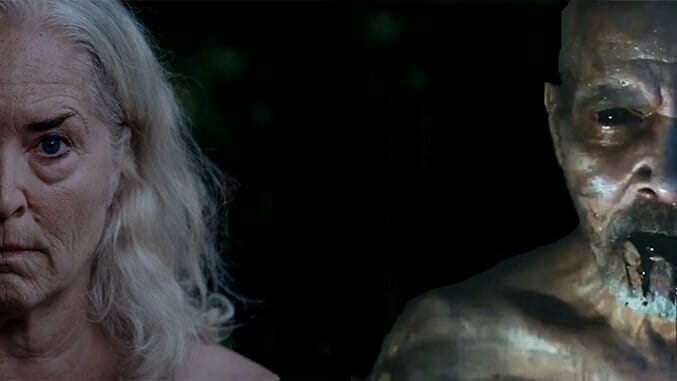The Family Ties That Bind Trey Edward Shults
On the horror of Krisha and It Comes At Night

In uncertain times, in an uncertain world, the one institution people can always rely on is family—unless they’re in a Trey Edward Shults movie.
In just two movies released in as many years, first with his 2016 debut, Krisha, and now with his freshly released follow-up, It Comes at Night, Shults has solidified his reputation as a filmmaker obsessed with family as a locus for tension. His debut, the former, is a family drama flick with dread lingering at its edges, like a Robert Altman film shot through a horror lens. The latter is a full-blown horror picture with family smack dab at its center, the story of two tribes struggling to survive in an America laid to ruin by the spread of a lethal, vaguely drawn pandemic. On screen they couldn’t be more different, one a personal, genre-bending effort Shults made with friends and family, the other a firmly genre-oriented movie made with a cast of known actors and in a familiar mode. In actuality, they’re as much kin as their characters are to each other, their tallied resentments, grudges and traumas notwithstanding.
For Shults, family isn’t about safety—family is the illusion of safety. In Krisha, the film’s namesake (played by Krisha Fairchild) walks into Thanksgiving celebrations after years of separation from her sister, Robyn (Robyn Fairchild), her brother-in-law, Doyle (Bill Wise), her son, Trey (played by Shults), and her entire extended family. The distance between Krisha and her clan is the consequence of her history of addiction—the film’s lurking bogeyman—which rears its ugly head as the time for turkey carving draws nearer. Krisha needn’t be haunted by real demons when the combustible combination of family and addiction has the same effect: Simply being in the room with relatives is enough to spark a slow-burning flame that leads her, and the whole get-together, to cinders (save for Doyle, who cackles with smug self-satisfaction).
In contrast to Krisha, It Comes at Night presents family as a sacrosanct construct for the express purpose of showing how easily that construct is dismantled despite anyone’s best attempts at keeping it together. The film plays out the growing friction between two families living together in dire circumstances as inevitable tragedy. Paul (Joel Edgerton), his wife Sarah (Carmen Ejogo) and his son Travis (Kelvin Harrison Jr.) live on their own in a disheveled farmhouse, where living is literally all they do: They maintain their home and hunt for supplies, taking breaks only to eat, hydrate and maybe, if occasion allows, play card games. When happened upon by outsiders—Will (Christopher Abbott), Kim (Riley Keough) and their son Andrew (Griffin Robert Faulkner)—Paul reacts defensively, only letting the newcomers into his family’s home after confirming their health and their intentions. The families gel at first, until they don’t, and all is brought to a head in a chilling barrage of gunfire.
In It Comes at Night, “family” is to be preserved, but families are never to be trusted. The paranoia that’s so intrinsic to Krisha’s protagonist is instead atmospheric in It Comes at Night, a veritable cloud of suspicion that sends Paul and Will into alpha male tailspins and brings about the destruction of all they love. The driving heart of both films is intimacy: It’s as key to Krisha’s exploration of addiction as a source of inner torment, as it is to It Comes at Night’s deconstruction of the idea of family. They’re made with the same style—intimacy verging on claustrophobia—but Krisha’s intimacy is focused inward, while It Comes at Night’s is outward.
-

-

-

-

-

-

-

-

-

-

-

-

-

-

-

-

-

-

-

-

-

-

-

-

-

-

-

-

-

-

-

-

-

-

-

-

-

-

-

-








































